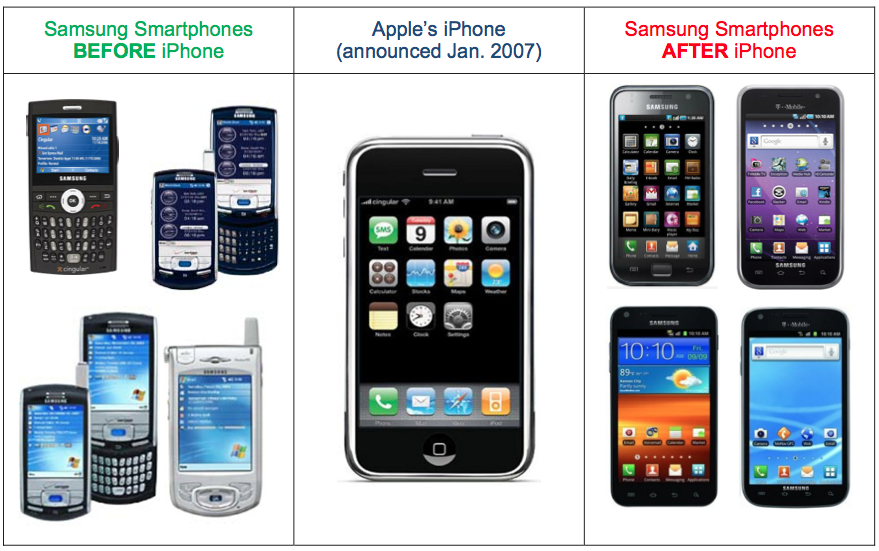In the Apple v. Samsung damages retrial on Tuesday, attorneys for each side offered their respective closing pitches to jurors -- one of which prompted Samsung to call for a mistrial -- as a decision is close at hand.

A slide from the Apple v. Samsung trial
During Tuesday's proceedings, Apple counsel Harold McElhinny used his allotted 90 minutes to restate evidence presented over the course of the week-long retrial, which for Apple is a chance to be "made whole" by reinstating some $380 million in vacated damages. In opposition, Samsung attorney William Price said Apple exaggerated the importance of the five patents-in-suit.
Of particular interest was a request to call a mistrial over a portion of McElhinny's closing arguments. According to CNET, the Apple lawyer said U.S. television manufacturers went belly-up because they did not adequately protect their patents. Samsung took this as playing a nationalistic/racial card, which has no place in the case.
"Our economy will disappear," McElhinny said of the U.S., offering the history of once-strong American TV manufacturers as an example. "If the cost of breaking the law is a small fine [...] Samsung's copying will have proven successful."
Despite hearing repeated requests for a mistrial, presiding U.S. District Court Judge Lucy Koh denied the motion, but instructed jurors to disregard where Apple and Samsung are based. Also not to be considered are race and other comments that could negatively color the arguments.
"I don't think what occurred rises to the level of a mistrial, but some remedy might be appropriate to avoid further issues later on," Koh said.
Comparison of Apple and Samsung devices. | Source: Apple v. Samsung court documents
According to further in-court reports from Reuters, Apple counsel Bill Lee hammered Samsung over its inability to produce senior executives for testimony, saying the jury should instead be guided by the Korean company's internal documents. The papers, when presented by Apple, point to an informed change in smartphone design and operation when the iPhone first debuted.
"Witnesses forget, or in the case of Samsung here, witnesses don't appear," Lee said.
As for Samsung, Price said the company is willing to pay a penalty for infringed patents, but noted it should not be made to overcompensate for design flourishes that any manufacturer should be able to incorporate in their products.
"Apple doesn't own beautiful and sexy," Price said. "What they're saying is, in the market, justice is just us."
The soon to be decided case involves 13 Samsung products found to be in infringement of five Apple patents. In 2012, the Apple v. Samsung jury trial awarded Apple $1.05 billion in damages incurred by Samsung's copycat products. Later, Judge Koh vacated $450 million from the total after finding discrepancies in that jury's calculations. The jurist called for a retrial on the products tied to the vacated damages to settle the matter.
Apple is seeking $380 million for lost profits, Samsung profits and royalties pertaining to the infringement of five U.S. patents. Samsung does not dispute that it infringed upon Apple's property, but argues damages should be limited to $53 million.
The retrial jury is scheduled to begin deliberations today.
